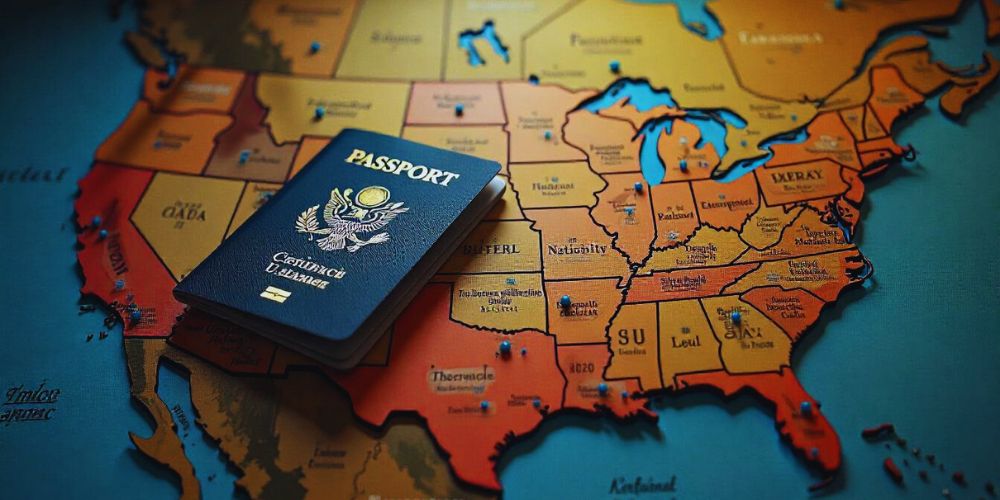
When it comes to immigration law and civic rights in the United States, the terms U.S. Citizen and U.S. National often create confusion. While both classifications offer specific rights and responsibilities under U.S. law, they are not synonymous. In this comprehensive guide, we will delve deep into the distinctions between these two statuses, covering legal definitions, rights, limitations, and key implications.
What Is a U.S. Citizen?
A U.S. citizen is an individual who holds full rights and responsibilities under the U.S. Constitution. Citizenship can be acquired in several ways:
– By Birth in the United States or U.S. territories (excluding some areas)
– Through Naturalization, after meeting eligibility requirements
– By Derivation through U.S. citizen parents under specific conditions
Rights of U.S. Citizens
U.S. citizens enjoy the most extensive set of rights and privileges, including:
– Voting in federal, state, and local elections
– Running for public office (except President and Vice President unless natural-born)
– Obtaining a U.S. passport
– Bringing family members to the U.S. more easily
– Protection from deportation
– Full access to federal employment and benefits
Citizenship is the pinnacle of legal status in the United States, ensuring the broadest possible legal protections.
What Is a U.S. National?
A U.S. national is any individual who owes their permanent allegiance to the United States. All U.S. citizens are U.S. nationals, but not all U.S. nationals are U.S. citizens.
The most prominent example of non-citizen U.S. nationals is individuals born in American Samoa and Swains Island. These individuals hold U.S. national status but are not granted full citizenship unless they apply for and are granted U.S. citizenship through naturalization.
Rights of U.S. Nationals (Non-Citizen)
Non-citizen U.S. nationals have many—but not all—rights that U.S. citizens possess:
– They can apply for a U.S. passport, which will designate them as a U.S. national
– They can live and work in the U.S. without restrictions
– They are protected while traveling abroad
– They may serve in the U.S. military
However, they cannot vote in U.S. elections or hold certain public offices. They also do not automatically pass on U.S. status to their children unless they naturalize as citizens.
Key Legal Distinctions Between U.S. Citizens and U.S. Nationals
| Feature | U.S. Citizen | U.S. National (Non-Citizen) |
|---|---|---|
| Right to Vote | ✔ Yes | ❌ No |
| Eligible for Federal Jobs | ✔ Yes | ❌ Limited |
| U.S. Passport | ✔ Yes (Indicates Citizenship) | ✔ Yes (Indicates National Only) |
| Deportation Risk | ❌ No | ❌ No |
| Can Sponsor Relatives | ✔ Extensive Rights | ❌ Limited |
| Eligibility for Public Office | ✔ Most Positions | ❌ Ineligible |
| Military Service | ✔ Yes | ✔ Yes |
| Born in American Samoa | ❌ No (Unless Naturalized) | ✔ Yes |
Territorial Birth and Its Impact on Legal Status
Understanding where a person is born is crucial when determining their status:
– Born in one of the 50 U.S. states or D.C.: Automatically a U.S. citizen.
– Born in Puerto Rico, Guam, Northern Mariana Islands, or U.S. Virgin Islands: U.S. citizen at birth.
– Born in American Samoa or Swains Island: U.S. national, but not a citizen (unless one parent is a citizen and transmits citizenship).
This legal nuance can create complex situations, especially for American Samoans who consider themselves part of the U.S. but are not granted all rights afforded to citizens.
Naturalization: The Path to Citizenship for U.S. Nationals
U.S. nationals may apply for naturalization to become full citizens. The process is generally simpler and faster compared to that for foreign-born individuals:
– No need for a green card
– Must meet residency and moral character requirements
– Must pass an English and civics test
– Must take the Oath of Allegiance
Upon approval, the individual gains full citizenship, including the right to vote and sponsor family members.
Implications for Travel and Passports
Both citizens and nationals can obtain U.S. passports, but the endorsement page will reflect their status:
– U.S. Citizen Passport: Grants all rights and consular protection
– U.S. National Passport: Includes a note stating “The bearer is a United States national and not a United States citizen.”
This distinction can impact travel and visa entry in foreign countries. Some nations may require a visa from non-citizen nationals that they would waive for U.S. citizens.

Legal Cases and Controversies
Over the years, legal challenges have questioned the constitutionality of denying citizenship to American Samoans. While some courts have ruled in favor of granting automatic citizenship to those born in American Samoa, others have upheld the current interpretation of the law under the Insular Cases doctrine.
As of now, Congress has the authority to determine citizenship status for territories not fully incorporated into the U.S.
Impact on Immigration Sponsorship
U.S. citizens have broad powers to sponsor family members for lawful permanent residence (green card status):
– Spouses
– Parents
– Siblings
– Unmarried and married children
In contrast, U.S. nationals cannot sponsor relatives unless they first naturalize as citizens.
This is a major consideration for nationals who have long-term plans to reunite with family in the United States.

Military and Federal Employment Opportunities
Although U.S. nationals are eligible to serve in the U.S. Armed Forces, many federal jobs require full citizenship due to security clearance restrictions. U.S. nationals may find themselves limited in career advancement opportunities within the government and defense sectors.
FAQs
1. How can I become a US citizen faster?
By marrying a US citizen or serving in the military, you may qualify for expedited naturalization.
2. What’s the best way to build credit as a new resident?
Start with a secured credit card, pay bills on time, and avoid high balances.
3. Is community college a good option for immigrants?
Absolutely. It’s affordable and often has ESL programs and transfer pathways.
4. Can I apply for scholarships if I’m not a citizen?
Yes, many private scholarships are open to non-citizens. Check eligibility rules.
5. What healthcare plans are available for low-income families?
Medicaid, CHIP (for children), and ACA subsidies can help reduce costs.
6. How can I find jobs that sponsor visas?
Use job boards like MyVisaJobs or LinkedIn and filter for “visa sponsorship” listings.
Conclusion: Know Your Status and Its Limitations
While both U.S. citizens and U.S. nationals share certain legal protections and freedoms, the distinctions are significant, especially concerning voting rights, sponsorship privileges, and eligibility for federal employment. Understanding these differences is essential for anyone seeking clarity on their status or looking to change it through naturalization.
If you or someone you know is a U.S. national residing in the United States, we strongly recommend considering naturalization to obtain the full spectrum of rights, benefits, and responsibilities that come with U.S. citizenship.

